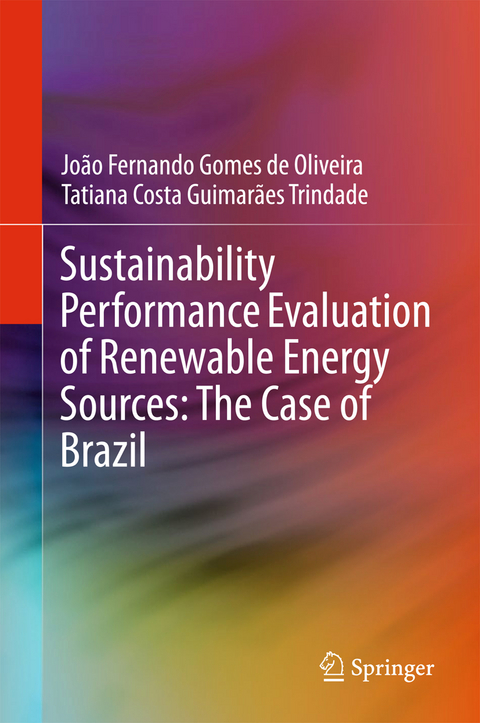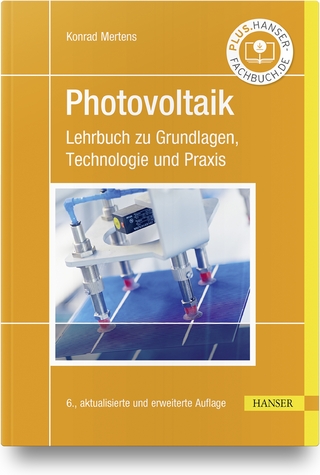
Sustainability Performance Evaluation of Renewable Energy Sources: The Case of Brazil
Springer International Publishing (Verlag)
978-3-319-77606-4 (ISBN)
The analysis is based on the study of sustainability indicators related to the technical, economic, social and environmental aspects of the evaluated energy systems. As the availability of renewable sources is very location-specific, the scope of this book covers two Brazilian States with distinct characteristics. It makes it possible to determine which renewable energy source is most adequate from a sustainability perspective, and in light of the analyzed scope and investor profile.
João F. G. Oliveira: Prof. João Oliveira graduated (1982) and earned his PhD (1988) in Mechanical Engineering - University of São Paulo, he was visiting scholar (1993 - 1994) and visiting professor (2016) at Mechanical Engineering - University of California at Berkeley. He is Professor of Mechanical Engineering at University of São Paulo with expertise in Innovation Management, Advanced Manufacturing and Industrial Sustainability. From 2008 through 2012 he served as President and CEO of the State of São Paulo Institute for Technological Research - IPT, a state owned research company with more than 1,200 collaborators. In IPT he implemented a large research investment program in order to support the research and development in cooperation with Brazilian companies on new energy projects, such as solar, wind, hydroelectric, deep water oil exploration, and others. He has published over 200 papers in journals, conferences, magazines and newspapers and holds five patents registered at Brazil's National Institute of Industrial Property (INPI). He received the major science awards in Brazil, such as the Great-Cross of the National Order of Scientific Merit by the Presidency of Brazil; the Conrado Wessel Foundation Award for Science and Culture; the CAPES- Anísio Teixeira Award for his contribution to education and research; the Personality of Technology Award by the São Paulo Association of Engineers; and the SAP Americas Innovation Award. Prof. Oliveira engaged in joint research with the industrial sector (TRW Automotive and Saint-Gobain Abrasives) and acted as a consultant of automotive industry worldwide including BMW, Hyundai, Chrysler, among others. He was co-founder and served as President and CEO of EMBRAPII-National Enterprise for Industrial Innovation and is member of the National Council of Science and Technology of the Brazilian Government and member of the Board for several research institutes and funding organizations. He is also Fellow and Vice-President of the Brazilian Academy of Sciences and Fellow of the International Academy for Production Engineering (CIRP). Tatiana C. G. Trindade: Graduated in Environmental Engineering from the School of Engineering of São Carlos (EESC), University of São Paulo. Through the Sciences Without Borders Program, she took part of undergraduate studies at the University of Toronto, Canada, where she received a broad introduction to renewable energy and sustainability. During the exchange year, she attended the Sustainability Conference at the University of Toronto where she learned about the challenges involving energy storage and the political implications of energy supply and use. She also participated in the Technological Diffusion Course in Introduction to Solar Photovoltaic Energy, offered by the State University of Campinas (Unicamp). In addition, she was part of an on-line training program promoted by the Renewable Energy Observatory of Latin America and the Caribbean (UNIDO), in which she enrolled in different modules on solar, wind and biogas energy. She developed her final project in the area of evaluation of sustainability indicators of the main renewable energy sources in Brazil.
lt;p>1. INTRODUCTION
1.1 OBJECTIVES
1.2 STRUCTURE
2. BIBLIOGRAPHICAL REVIEW
2.1 OVERVIEW OF THE WORLD ENERGY GRID
2.1.1 Non Renewable Energy
2.1.2 Renewable Energies
2.1.3 Challenges for the Development of Renewable Energies
2.2 BRAZILIAN ENERGY GRID
2.2.1 Retrospective of Production and Consumption
2.2.2 Characteristics of the Electrical System
2.2.3 Programs and Incentives
2.3 HYDROELECTRIC POWER
2.3.1 Potentials and Hydropower Generation in Brazil
2.3.2 Basic Principles of Hydropower Generation
2.3.3 Sustainability of Hydropower Generation
2.4 WIND ENERGY
2.4.1 Potentials and Generation of Wind Energy in Brazil2.4.2 Basic Principles of Wind Power Generation
2.4.3 Sustainability of Wind Energy
2.5 PHOTOVOLTAIC SOLAR ENERGY
2.5.1 Potentials and Solar Power Generation in Brazil
2.5.2 Basics of Photovoltaic Power Generation
2.5.3 Sustainability of Photovoltaic Energy
2.6 SUSTAINABILITY INDICATORS
3. METHODOLOGY
3.1 CHARACTERIZATION AND CLASSIFICATION OF RESEARCH
3.2 DELIMITATION OF THE RESEARCH
3.3 COLLECTION AND DATA ANALYSIS TECHNIQUES AND INSTRUMENTS
3.4 LIMITATIONS OF THE METHOD
4. EVALUATION OF RENEWABLE ENERGY TECHNOLOGIES IN TWO BRAZILIAN REGIONS
4.1 SCOPE DEFINITION
4.2 CASE STUDIES
4.2.1 Garibaldi Hydro Power Plant
4.2.2 Água Doce Wind Farm
4.2.3 Tubarão Photovoltaic Power Plant
4.2.4 Açude Castanhão Hydro Power Plant
4.2.5 Praia Formosa Wind Farm
4.2.6 Telles Group Photovoltaic Power Plant
4.3 DETERMINATION OF SUSTAINABILITY INDICATORS
4.3.1 Economic Indicators
4.3.2 Technical Indicators
4.3.3 Environmental Indicators
4.3.4 Social Indicators
4.4 PERFORMANCE EVALUATION IN SUSTAINABILITY
4.5 APPLICATION OF THE METHOD TO CASE STUDIES
4.5.1 Evaluation of Scenario 1 (CN-MON)
4.5.2 Evaluation of Scenario 2 (CN-ECO)
4.5.3 Evaluation of Scenario 3 (CN-SUST)
4.6 SUMMARY OF RESULTS
5. DISCUSSION
6. CONCLUSIONS
6.1 SUGGESTIONS FOR FUTURE WORK
7. BIBLIOGRAPHY
APPENDIX A - MEMORIAL CALCULATION OF INDICATORS
APPENDIX B - MEMORIAL CALCULATION OF AGGREGATE INDEX OF SUSTAINABILITY
| Erscheinungsdatum | 21.04.2018 |
|---|---|
| Zusatzinfo | XXV, 130 p. 29 illus., 28 illus. in color. |
| Verlagsort | Cham |
| Sprache | englisch |
| Maße | 155 x 235 mm |
| Gewicht | 403 g |
| Themenwelt | Naturwissenschaften ► Biologie ► Ökologie / Naturschutz |
| Technik ► Elektrotechnik / Energietechnik | |
| Wirtschaft ► Volkswirtschaftslehre | |
| Schlagworte | renewable energy • Renewable energy sources in Brazil • Sustainability analysis of Hydroeletric power plan • Sustainability analysis of Hydroeletric power plants • Sustainability analysis of Solar power plants • Sustainability analysis of Wind power plants • Sustainability Indicators • sustainability of renewable sources • Sustainability Performance Evaluation |
| ISBN-10 | 3-319-77606-1 / 3319776061 |
| ISBN-13 | 978-3-319-77606-4 / 9783319776064 |
| Zustand | Neuware |
| Haben Sie eine Frage zum Produkt? |
aus dem Bereich


